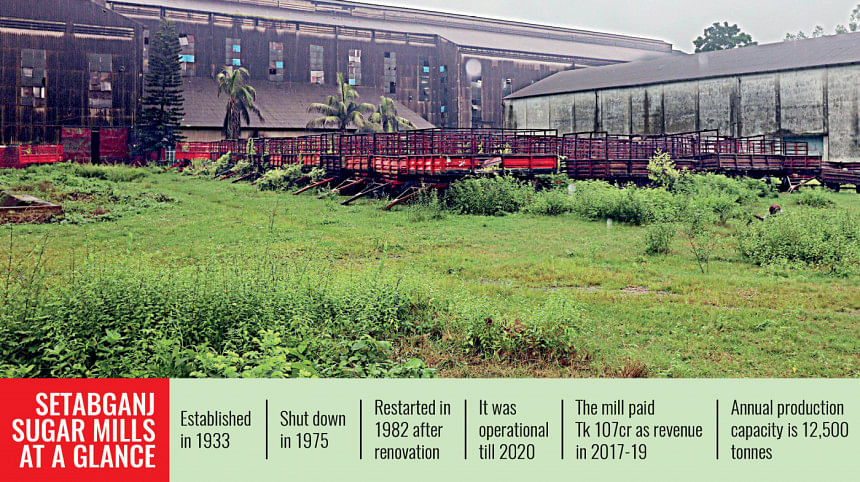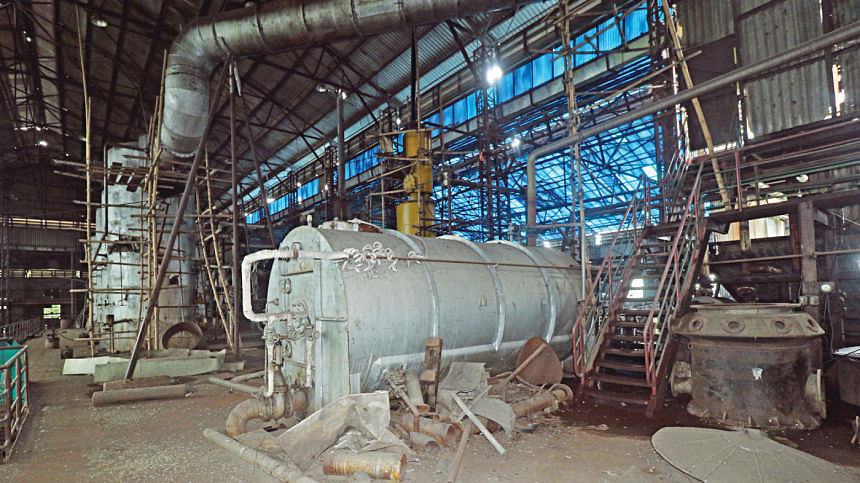Workers happy as Setabganj Sugar Mills prepares for reopening

Setabganj Sugar Mills in the northern district of Dinajpur is preparing to reopen after a four-year closure, a move that has been cheered by former factory workers and local sugarcane farmers.
Mohammad Abul Bashar, managing director of the mill, said the mill is currently waiting for repairs to production units and assessing the sugarcane supply.
He said that crushing operations may resume either this year or in the next season in fiscal year 2025-26.
"Sugarcane planting for the 2024-25 season has already begun," the MD said. "If we miss that, then the mill will resume in the 2025-26 season after repair and overhauling."
"We expect the mill to be fully operational within two years if planting and repairs proceed smoothly," he added. "Repair work will begin soon."
There are 15 public sugar mills in the country under the Bangladesh Sugar and Food Industries Corporation (BSFIC). In 2020, the previous Awami League government suspended production at six mills, including Setabganj, citing a shortage of sugarcane supply and recurring losses.
Authorities at the time said these mills would reopen after upgrades and modernisation.

After the political changeover in August 2024, the interim government formed a taskforce to assess the mills. Subsequently, the reopening of Setabganj Sugar Mills was announced in mid-December last year.
Amjad Hossain, a former president of the Setabganj Sugar Mills Workers' Union, said, "After working here for 27 years, the abrupt decision of mill closure frustrated me. Now it is reopening and we are happy about it."
Prashanta Kumar, another worker, said they are grateful to the government for the reopening decision. "We are looking forward to resuming crushing operations as soon as possible."
Established in 1933 on 3,783 acres of land at Bochaganj municipality area, Setabganj Sugar Mills closed in 1975 due to deteriorating financial conditions but reopened in 1982 after modernisation and upgrades.
The annual production capacity of the sugar mill was 12,500 tonnes. Apart from sugar, the mill produced organic fertilisers, molasses and bagasse as byproducts.
It continued operating until the 2019-2020 season before being shut down again.
Local sugarcane farmers blamed politically motivated factors for the mill's closure.
Md Wali, one of the farmers, alleged, "The mill was fully operational when it was shut down. Certain groups conspired to capture its assets."
Mamun, general secretary of the Sugarcane Farmers' Association, said that sugar production was never halted due to a lack of supply from the farmers.
"Production costs were artificially inflated for showing higher losses," he claimed.
With the reopening announcement, Mamun said farmers are now preparing for the next planting season.
Industries Adviser Adilur Rahman Khan visited the sugar mill on November 16 last year.
He said his ministry would lend full support for resuming cane crushing.
Bangladesh annually requires 24 lakh tonnes of sugar and because of scanty domestic production of sugarcane, imported sweetener meets around 99 percent of the total requirement.
Five private refiners import raw sugar, mainly from Brazil, to process and market locally.

 For all latest news, follow The Daily Star's Google News channel.
For all latest news, follow The Daily Star's Google News channel. 



Comments